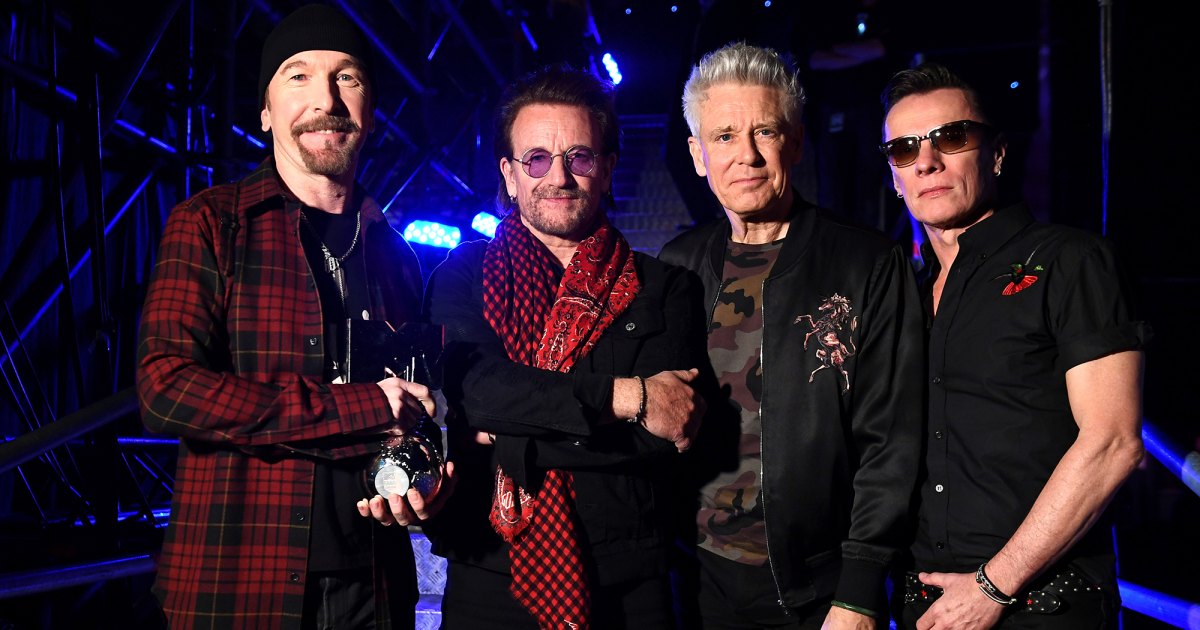The Edge, Bono, Adam Clayton and Larry Mullen Jr of U2. Ian Gavan/Getty Images for MTV
All of Us remember where we were when a new U2 album popped up on our Apple devices essentially unannounced.
For fans of the hugely popular Irish rock band, who have been cranking out seminal albums and winning Grammys since the ‘80s, a free digital download of their 2014 effort, Songs of Innocence, was cause for celebration. On the other hand, those non-fans who carefully curated their music libraries weren’t so thrilled with the surprise release.
To say the innovative method of distributing the record in the earlier days of streaming wasn’t a hit across the board might be an understatement — but the group is fully aware of where the plan went wrong.
What Happened:
In September 2014, Apple was gearing up to launch the iPhone 6 when rumors swirled that U2 — who have a close working relationship with the tech company — would be involved in the big event. At the time, a spokesperson for the band denied both a new album and a performance at the launch, but when the products were unveiled in Cupertino, California, the band came out to perform a new song called “The Miracle (of Joey Ramone).”
When CEO Tim Cook joined U2 on stage, he hinted that fans were eager for “a whole album” that sounded like what just earned a standing ovation from the crowd. In turn, Bono revealed that the band had indeed been working on a new record — and that they wanted to “get it to as many people as possible.”
Mere moments later, U2’s 13th record, Songs of Innocence, was automatically downloaded on more than 500 million Apple devices in 119 countries, completely free of charge. What was intended to be a generous offer to music lovers around the world, however, became a strategic nightmare that continues to haunt U2 (and Us) years later.
Why It Was a Big Deal:
The free album download was an attempt to assert Apple’s dominance in the streaming boom when Spotify was rapidly gaining popularity and to reintroduce U2 to a new generation of fans. Waking up to a surprise album that couldn’t be removed from a music library with already limited storage didn’t sit well with many users, despite the good intentions of both Apple and U2.

Amid the backlash, Apple attempted to give listeners a solution. “If you would like U2’s Songs of Innocence removed from your iTunes music library and iTunes purchases, you can choose to have it removed,” read a page on the Apple website shortly after the free download debacle. “Once the album has been removed from your account, it will no longer be available for you to redownload as a previous purchase. If you later decide you want the album, you will need to get it again. The album is free to everyone until October 13, 2014 and will be available for purchase after that date.”
Cook called the digital drop “the largest album release of all time,” and according to Apple, 33 million people accessed Songs of Innocence in its first week. Data aside, the public response to the album’s rollout was one of widespread frustration.
What People Said:
To this day, the free U2 album sparks conversation — but it’s usually not positive. One of the biggest complaints from many social media users back in 2014 was that the album was “forced” upon them without their approval.
“Woke up this morning to find Bono in my kitchen, drinking my coffee, wearing my dressing gown, reading my paper. #U2 #Apple,” one tweet read. Another user asked, “Anyone know how I could have 12 recordings of myself farting appear in Bono’s iTunes?”
While promoting the album’s physical release in October 2014, Bono candidly addressed the “kerfuffle” in an interview with NPR. “We wanted to deliver a pint of milk to people’s front porches, but in a few cases, it ended up in their fridge, on their cereal,” he said at the time. “People were like, ‘I’m dairy-free.’”
The situation, of course, came up during a Facebook Q&A hosted by the band that same month. “Oops,” Bono replied. “I’m sorry about that. I had this beautiful idea and we got carried away with ourselves. Artists are prone to that kind of thing: [a] drop of megalomania, touch of generosity, dash of self-promotion and deep fear that these songs that we poured our life into over the last few years mightn’t be heard. There’s a lot of noise out there. I guess we got a little noisy ourselves to get through it.”
Guy Oseary, U2’s manager, referred to the free release as a “gift” while speaking to Mashable about the backlash. “There are people who are going to be thrilled to get a gift. There are people who are not going to care to have this gift. We knew all of that going in. No surprises here,” he claimed. “If someone doesn’t like it, then great, that’s OK, delete it.”
Reflecting on the controversy in his 2022 memoir, Surrender: 40 Songs, One Story, Bono took “full responsibility” for the mishap. “I’d thought if we could just put our music within reach of people, they might choose to reach out toward it. Not quite,” he wrote.

What Happened Next:
In his book, Bono recounted his conversation with Oseary, Cook and other Apple execs before the 2014 launch event, during which he compared the planned Songs of Innocence release to “when Netflix buys the movie and gives it away to subscribers.”
“Tim looked at me as if I was explaining the alphabet to an English professor. ‘But we’re not a subscription organization,’” he wrote. “‘Not yet,’ I said. ‘Let ours be the first.’”
And in a way, it was. Apple Music, the company’s own streaming platform, officially launched in June 2015, effectively taking the place of iTunes for many Apple users (or, perhaps more accurately, for anyone who doesn’t use Spotify). Apple Music offers monthly subscriptions at different price points for students, individuals or families, and in October 2022, the platform reached a milestone of 100 million songs in its streaming catalog. Subscribers can also tune in to 24-hour live radio on Apple Music 1, Apple Music Hits and Apple Music Country.
Whether U2 actually prompted the shift in Apple’s programming is unclear, but the Songs of Innocence scandal didn’t prevent the band from dreaming up even more big collaborations with the tech company. In a September 2014 TIME interview, Bono hinted at the band’s next project with Apple.
“[It’s] an audiovisual interactive format for music that can’t be pirated and will bring back album artwork in the most powerful way, where you can play with the lyrics and get behind the songs when you’re sitting on the subway with your iPad or on these big flat screens,” he said. “You can see photography like you’ve never seen it before.”
Apple declined to comment on “future product plans” at the time. Few more details emerged about Bono’s secret project, but Apple Music now features lyrics, spatial audio and exclusive video content for subscribers.



